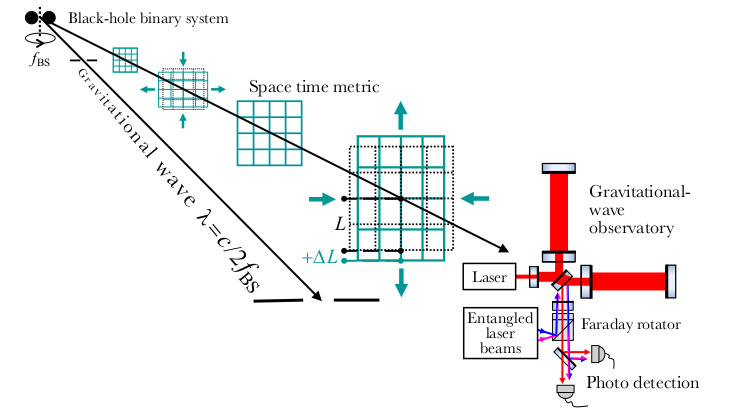Quantum Physics
Entanglement might reduce costs of GW observatories
10 February 2020

Photo: Ag Schnabel
Quantum noise is a limiting issue in high-precision measurements of gravitational waves. Recently, we performed a proof-of-principle experiment about the sensitivity enhancement of gravitational-wave observatories via quantum entanglement of laser light. Our results were published in Nature Photonics.
Link: https://www.nature.com/articles/s41566-019-0583-3
Quantum nature of laser light, as manifested in the uncertainty of the photon rate, limits the measurement sensitivity of the observatories in two ways. On the one hand, the strength of the photon radiation pressure on the mirrors is uncertain, which produces a fluctuating motion of the mirrors, masking signals from gravitational waves. On the other hand, the light power in the output of the interferometer fluctuates, producing photon counting noise (shot noise) in the photodetectors. It is possible to reduce these noises by using more light power, heavier mirrors, longer arms in the detector or light with squeezed quantum uncertainty. But this is just the expensive conventional approach.
Since April 2019, all gravitational-wave observatories use laser light with squeezed quantum uncertainty to increase the measurement sensitivity. However, this technique just `squeezes’ photon counting noise and only allows the improvement for signal frequencies above 100 Hz. Our newly invented technique allows the simultaneous improvement of the observatory sensitivity below 100 Hz. This is done by additionally suppressing quantum radiation-pressure fluctuations. For this purpose, the laser beam of the observatory is overlapped with two (weak) entangled laser beams. The quantum uncertainties of entangled light beams are correlated. When overlapping the entangled beams in the output of the observatory, the correlated uncertainties cancel each other to a large extend at all signal frequencies. This increases the resolution for all gravitational-wave signals. With this technique the costs for the operation of a gravitational-wave observatory can potentially be decreased significantly.
